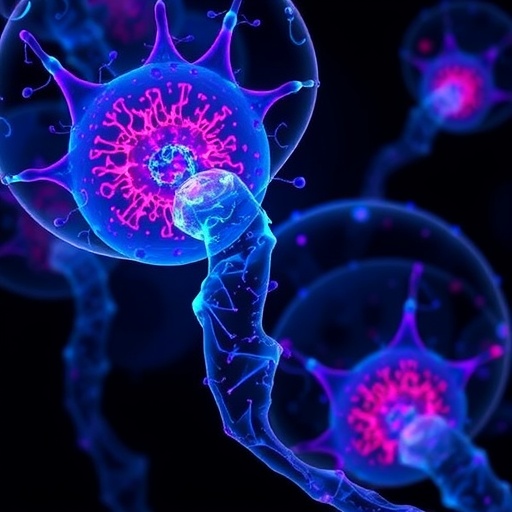
New Haven, Conn. — In an extensive new investigation into the biology of kidney cancers, researchers have uncovered critical insights that may reshape therapeutic approaches to a rare but challenging subtype known as chromophobe renal cell carcinoma (ChRCC). Unlike other kidney cancers, ChRCC exhibits a stark deficiency in cancer-fighting T-cells, the immune system’s frontline agents responsible for identifying and destroying malignant cells. Even the T-cells that infiltrate these tumors display a puzzling indifference to cancerous threats, rendering traditional immunotherapies largely ineffective and highlighting an urgent need for brand-new treatment paradigms.
Published in the July 2 edition of the Journal of Clinical Oncology, this study leverages cutting-edge machine learning and single-cell sequencing technologies to dissect the tumor microenvironment and immune landscape of ChRCC. By focusing on cellular-level distinctions, the research team aimed to untangle the complex interplay between tumor cells and immune defense mechanisms, uncovering biological nuances that could explain the limited success of immune checkpoint inhibitors in patients with this rare cancer variant.
Chromophobe renal cell carcinoma accounts for approximately five percent of all kidney cancers and is notorious for its poor response to standard immunotherapeutic treatments. Compared to more prevalent kidney tumors, such as clear cell carcinoma, ChRCC shows a diminished presence of T-cells and markedly reduced expression of key molecules essential for invoking an effective immune response. This immunological coldness correlates strongly with poorer patient survival outcomes, underscoring the urgent need for therapies tailored to the unique immune environment of ChRCC tumors.
.adsslot_nBVxGWtoQr{width:728px !important;height:90px !important;}
@media(max-width:1199px){ .adsslot_nBVxGWtoQr{width:468px !important;height:60px !important;}
}
@media(max-width:767px){ .adsslot_nBVxGWtoQr{width:320px !important;height:50px !important;}
}
ADVERTISEMENT
“Chromophobe renal cell carcinoma remains a formidable clinical challenge because our understanding of its underlying biology has lagged,” stated Dr. David Braun, corresponding author of the study and a distinguished researcher at Yale Cancer Center. “Most of the treatments currently available were developed with other kidney cancers in mind and fail to reflect the immune characteristics specific to ChRCC. Our findings open a pathway toward designing more effective, cancer-specific immunotherapies.”
This groundbreaking work was a collaborative effort spanning multiple renowned institutions, including Yale Cancer Center, Brigham and Women’s Hospital, Dana-Farber Cancer Institute, and MD Anderson Cancer Center. The study’s first author, Dr. Chris Labaki of Beth Israel Deaconess Medical Center, led a team comprising dozens of researchers from the United States and Canada, emphasizing the broad scientific cooperation required to tackle complex oncological questions.
The research harnessed advanced machine learning algorithms to analyze individual tumor cells, successfully tracing the origin of ChRCC cells back to a distinct population known as α-intercalated cells within the kidney. This pinpointed lineage identification is crucial for understanding how these tumors develop and evade immune detection. By comparing gene activity profiles between tumor cells and their normal precursors, the team identified specific genes altered in ChRCC that likely contribute to immune evasion mechanisms.
What distinguishes ChRCC’s immune environment from that of other kidney cancers is the nature of its immune evasion. Unlike more common kidney tumors, where T-cells are abundant but rendered dysfunctional—often termed ‘exhausted’—ChRCC presents a landscape where T-cells are not only scarce but also fail to engage the tumor effectively. This fundamental difference casts doubt on the efficacy of conventional immune checkpoint blockade therapies, which rely on reinvigorating existing T-cell responses.
Dr. Braun elaborated, “In more typical kidney cancers, exhausted immune cells are present in significant numbers, and immune checkpoint inhibitors can restore their activity. However, in ChRCC, immune evasion operates via a distinct mechanism whereby cancer-specific immune cells are not adequately recruited into the tumor microenvironment. Hence, future immunotherapeutic strategies must focus on attracting and activating these cells within the tumor itself.”
The study’s single-cell sequencing approach further elucidated the tumor microenvironment, mapping out the interactions between cancerous cells and various types of immune cells. This high-resolution cellular profiling allowed the team to detect subtle but critical differences in gene expression and immune cell composition, offering new targets that may be exploited to design precision immunotherapies tailored to overcome ChRCC’s unique barriers.
Despite its novel insights, the study acknowledges important limitations, primarily related to cohort size, which remains a challenge due to the rarity of ChRCC. The authors call for additional research with larger patient samples and more diverse populations to validate these findings and translate them into effective clinical interventions.
Funding for this study was provided by an array of prestigious institutions, including the U.S. Department of Defense, the Kidney Cancer Association Trailblazer Award, the Louis Goodman and Alfred Gilman Yale Scholar Fund, and the National Cancer Institute, among others. These investments underscore the vital importance of deepening scientific understanding of rare cancers like ChRCC.
This research not only advances the basic biological knowledge of a difficult-to-treat kidney cancer subtype but also charts a new direction for immunotherapy development. The revelations about immune cell scarcity and dysfunction in ChRCC compel the scientific community to rethink current paradigms and to innovate targeted immunotherapeutic strategies capable of engaging the immune system more effectively.
In summary, the study underscores a paradigm shift in kidney cancer treatment by demonstrating that ChRCC’s unique immune microenvironment demands bespoke approaches. By precisely characterizing the tumor’s origin and immune evasive tactics, researchers have laid foundational work that could lead to new immunotherapies, offering hope for improved outcomes in patients suffering from this rare but impactful disease.
Subject of Research: Biology and immune landscape of chromophobe renal cell carcinoma (ChRCC)
Article Title: N/A (not provided in the source)
News Publication Date: July 3, 2025
Web References: N/A
References: Published report in the Journal of Clinical Oncology, July 2, 2025
Image Credits: N/A
Keywords: Kidney cancer, chromophobe renal cell carcinoma, T-cells, immune evasion, immunotherapy, tumor microenvironment, single-cell sequencing, machine learning
Tags: cancer treatment innovationschromophobe renal cell carcinoma researchimmune checkpoint inhibitors effectivenessimmune system and cancerimmunotherapy challenges in ChRCCkidney cancer biologymachine learning in oncologyrare kidney cancer subtypessingle-cell sequencing technologyT-cell deficiency in tumorstherapeutic approaches for ChRCCtumor microenvironment analysis





